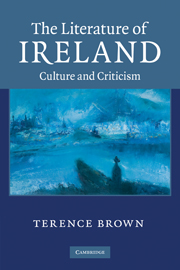Book contents
- Frontmatter
- Contents
- Acknowledgements
- Introduction
- 1 The Literary Revival: historical perspectives
- 2 Joyce's magic lantern
- 3 Music: the cultural issue
- 4 Modernism and revolution: rereading Yeats's ‘Easter 1916’
- 5 Shakespeare and the Irish self
- 6 Irish literature and the Great War
- 7 Ireland, Modernism and the 1930s
- 8 Post-modernists: Samuel Beckett and Flann O'Brien
- 9 Patrick Kavanagh: religious poet
- 10 MacNeice's Irelands: MacNeice's islands
- 11 Louis MacNeice and the Second World War
- 12 MacNeice and the puritan tradition
- 13 John Hewitt and memory: a reflection
- 14 Michael Longley and the Irish poetic tradition
- 15 Seamus Heaney: the witnessing eye and the speaking tongue
- 16 Derek Mahon: the poet and painting
- 17 Telling tales: Kennelly's Cromwell and Muldoon's ‘The More a Man Has the More a Man Wants’
- 18 Redeeming the time: John McGahern and John Banville
- 19 ‘Have we a context?’: transition, self and society in the theatre of Brian Friel
- 20 Hubert Butler and nationalism
- 21 The Irish Dylan Thomas: versions and influences
- Index
- References
17 - Telling tales: Kennelly's Cromwell and Muldoon's ‘The More a Man Has the More a Man Wants’
Published online by Cambridge University Press: 05 June 2012
- Frontmatter
- Contents
- Acknowledgements
- Introduction
- 1 The Literary Revival: historical perspectives
- 2 Joyce's magic lantern
- 3 Music: the cultural issue
- 4 Modernism and revolution: rereading Yeats's ‘Easter 1916’
- 5 Shakespeare and the Irish self
- 6 Irish literature and the Great War
- 7 Ireland, Modernism and the 1930s
- 8 Post-modernists: Samuel Beckett and Flann O'Brien
- 9 Patrick Kavanagh: religious poet
- 10 MacNeice's Irelands: MacNeice's islands
- 11 Louis MacNeice and the Second World War
- 12 MacNeice and the puritan tradition
- 13 John Hewitt and memory: a reflection
- 14 Michael Longley and the Irish poetic tradition
- 15 Seamus Heaney: the witnessing eye and the speaking tongue
- 16 Derek Mahon: the poet and painting
- 17 Telling tales: Kennelly's Cromwell and Muldoon's ‘The More a Man Has the More a Man Wants’
- 18 Redeeming the time: John McGahern and John Banville
- 19 ‘Have we a context?’: transition, self and society in the theatre of Brian Friel
- 20 Hubert Butler and nationalism
- 21 The Irish Dylan Thomas: versions and influences
- Index
- References
Summary
Brendan Kennelly's Cromwell appeared to variously astonished and celebratory reviews in Dublin in 1983. Since then, despite its republication in England in 1987, it has attracted surprisingly little critical attention. Perhaps there was something overwhelming about its obsessional tones, its urgent formal repetitions, its piling of horror on horror, its Blakean raid on the palace of wisdom by the road of excess, which has not allowed it to appeal to the critical intelligence with its taste for allusive uncertainties, irony, structural niceties and the aesthetic frisson. The poem therefore has enjoyed to date a curious kind of critical half-life, reckoned the work in which Kennelly achieved a breakhrough from being a poet of minor lyric successes (in itself a misreading of his earlier work) to being a poet with something altogether more significant to say, and simultaneously as a work which does not require sustained analysis or exacting attention. It is absorbed into critical comprehension as a work of shock effects, video nasty sensationalism, scarifyingly explicit violence and bold, rhetorical drama. Seamus Heaney in nominating Cromwell as one of his books of 1983 in the Dublin-published Sunday Tribune newspaper encapsulated this general critical consensus when he spoke of ‘a sense of an outbreak’. An outbreak is certainly hard to pin down, is critically difficult to contain and tends to lack apologists and sponsors.
- Type
- Chapter
- Information
- The Literature of IrelandCulture and Criticism, pp. 210 - 224Publisher: Cambridge University PressPrint publication year: 2010



